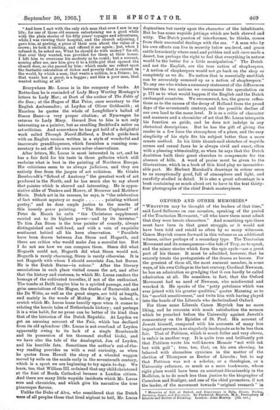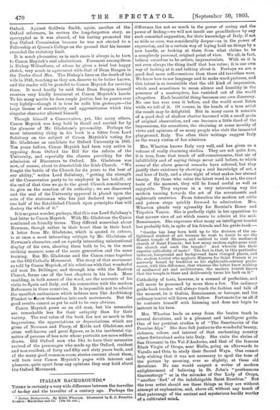OXFORD AND OTHER MEMORIES.* " WHATEVER may be thought of
the leaders of that time," said Lord Selborne on one occasion, speaking of the period of the Tractarian Movement, " all who knew them must admit that they were heroic characters." And something epic there must have been in that great struggle, or it would not have been told and retold so often by so many witnesses. Canon Meyrick comes forward in this volume as an additional witness, rather perhaps of a secondary type. The Tractarian Movement and its consequences—the tale of Troy, so to speak, and the minor stories which form the epic cycle—are a great part of his theme. It must be admitted, however, that he scarcely treats the protagonists of the drama as heroes. For the greatest of them all, the most eminent member, in some ways, of his own College in the last century, Cardinal Newman, he has an admiration so grudging that it can hardly be called admiration at all. He considers, in fact, that the Oxford Movement had no need of Newman, who misdirected and wrecked it. He speaks of the " petty petulance which was ever joined with his greater qualities," quotes Manning as to his "morbid sensitiveness," and twits him with having played into the hands of the Liberals who declericalised Oxford.
For these same Liberals Canon Meyrick has no more liking, and he recounts with much satisfaction the sermon which he preached before the University against Jowett's commentary on the Epistles of St. Paul. His account of Jowett himself, compared with his accounts of many less important persons, is so singularly inadequate as to be less than fair. That of Pattison, which is much fuller and very clever, is unfair in another way. It is quite true and brilliantly put that Pattison wrote his well-known Memoir "not with ink but with gall " ; true, too, that, on his own showing, he behaved with shameless cynicism in the matter of the election of Thompson as Rector of Lincoln ; but to say that Pattison was not a scholar, or a theologian, or a University reformer, so much as a mere bookworm, whose right place would have been an assistant-librarianship in the Bodleian, is to do much less than justice to the biographer of Casanbon and Scaliger, and one of the chief promoters, if not the leader, of the movement towards "original research" in
* Memories of Life at Oxford, and Experiences in Italy, Greece, Turkey, Germany, Spain, and Elsewhere. By Frederick Meyriek, M.A., Prebendary of : Lincoln and Rector of Blickling. London : John Murray. [12s. net.]
Oxford. Against Goldwin Smith, again, another of the Oxford reformers, he revives the long-forgotten story, as apocryphal as it was absurd, of his having promoted the first Oxford Commission because he was not elected to a Fellowship at Queen's College on the ground that his income exceeded the statutory limit.
It is much pleasanter, as in such cases it always is, to turn to Canon Meyrick's real adinirations. Foremost among these is Bishop Wilberforce, of whom he gives a brief but happy sketch, very much in agreement with that of Dean Burgon in the Twelve Good Men. The Bishop's lines on the death of his wife in 1841, touching as they are, deserve to be better known, and the reader will be grateful to Canon Meyrick for reviving them. It need hardly be said that Dean Burgon himself receives very kindly treatment at Canon Meyrick's hands. To his many merits he does ample justice, but he passes over very lightly—though it is true he calls him grotesque—the large license of eccentricity and aggressiveness which this singular character allowed himself.
Though himself a Conservative, yet, like many others, Canon Meyrick was long held in thrall and carried far by the glamour of Mr. Gladstone's personality. Perhaps the most interesting thing in his book is a letter from Lord Salisbury on the subject of Canon Meyrick's voting for Mr. Gladstone as candidate for Oxford University in 1865. Ten years before, Canon Meyrick had been very active in opposing from Oxford the Bill for the reform of the University, and especially the clauses providing for the admission of Dissenters to Oxford. Mr. Gladstone was now, of course, about to disestablish the Irish Church. "We fought the battle of the Church for six years to the best of our ability," writes Lord Salisbury, " getting the strength of the Conservative party to be employed in her behalf ; at the end of that time we go to the great Church constituency to give us the sanction of its authority ; we are disavowed and the seal of the University approval is placed upon the acts of the statesman who has just declared war against one half of the Established Church upon principles that will destroy the whole of it."
It is no great wonder, perhaps, that this was Lord Salisbury's last letter to Canon Meyrick. With Mr. Gladstone the Canon continued on friendly terms. They differed somewhat about Newman, though rather in their heart than in their head. A 'letter from Mr. Gladstone, which is quoted in extenso, is at once a most interesting critique by Mr. Gladstone of Newman's character, and an equally interesting unintentional display of his own, showing them both to be, in the most striking manner, sons of the same generation and the same training. But Mr. Gladstone and the Canon came together on the Old Catholic Movement. The story of that movement as told by Canon Meyrick, of his relations with that wonderful old man Dr. Dollinger, and through him with the Eastern Church, forms one of the best chapters in his book. More rambling, in both senses of the word, are the accounts of his visits to Spain and Italy, and his connection with the modern Reformers in these countries. It is impossible not to admire the unselfish enthusiasm which induces men like Archbishop Plunket to Ihrow themselves into such movements. But the good results cannot as yet be said to be very obvious.
Canon Meyrick poses as an old man, but his memories are remarkable less for their antiquity than for their variety. The real value of the book lies not so much in the impressions, the appreciations or depreciations, which are given of Newman and Pusey, of Keble and Gladstone, and other well-known and great figures, as in the incidental vig- nettes of persons of less note whose portraits are more seldom drawn. Old Oxford men who like to have their memories revived of the personages who made up the Oxford, resident and non-resident, of forty and fifty and sixty years back, and of the many good common-room stories current about them, will turn over Canon Meyrick's pages with interest and pleasure, quite apart from any opinions they may hold about the Oxford Movement.











































 Previous page
Previous page